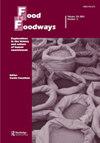What is enough on a plate? Professionals’ practices of providing an “adequate portion” in the food service sector
IF 1.1
Q2 ANTHROPOLOGY
引用次数: 1
Abstract
Abstract The current systems of food production and consumption are not sustainable due to a high level of resource inefficiency, environmental pollution and unhealthy eating habits. This paper focuses on the issues of wasting food and overeating, which have received increasing attention in other recent studies on the food service sector. A majority of those studies look at the choices made by customers regarding portion size and the effect those choices have on consumed food and leftovers. Against this background, the current exploratory study addresses the professionals’ perspective on why and how they serve specific food amounts to customers. To answer this question, the study draws on qualitative research and an analytical framework derived from theories of practice. The results show that defining and providing adequacy depends on professionals’ prior knowledge, the gastronomic concept, reflections on health and pricing issues, prevailing kitchen infrastructures, work rhythms, and esthetics in food presentation. An explanatory model is further developed in order to categorize these factors in terms of work processes inside and outside of professional kitchens. These insights of portioning control allow to conclusively reflect on much needed strategies for reducing food waste and preventing excessive caloric intakes.盘子里有什么足够?专业人员在食品服务部门提供“充足份额”的做法
摘要由于资源效率低下、环境污染和不健康的饮食习惯,目前的食品生产和消费体系是不可持续的。这篇论文的重点是浪费食物和暴饮暴食的问题,这些问题在最近对食品服务部门的其他研究中越来越受到关注。这些研究中的大多数都着眼于顾客对份量的选择,以及这些选择对所吃食物和剩菜的影响。在这种背景下,目前的探索性研究从专业人士的角度探讨了他们为什么以及如何为顾客提供特定数量的食物。为了回答这个问题,本研究采用了定性研究和从实践理论中得出的分析框架。结果表明,定义和提供充分性取决于专业人员的先验知识、美食概念、对健康和定价问题的思考、普遍的厨房基础设施、工作节奏和食物展示的美学。为了根据专业厨房内外的工作流程对这些因素进行分类,进一步开发了一个解释模型。这些对分配控制的见解使我们能够最终反思减少食物浪费和防止热量摄入过多所急需的策略。
本文章由计算机程序翻译,如有差异,请以英文原文为准。
求助全文
约1分钟内获得全文
求助全文
来源期刊

Food and Foodways
ANTHROPOLOGY-
CiteScore
2.20
自引率
0.00%
发文量
16
期刊介绍:
Food and Foodways is a refereed, interdisciplinary, and international journal devoted to publishing original scholarly articles on the history and culture of human nourishment. By reflecting on the role food plays in human relations, this unique journal explores the powerful but often subtle ways in which food has shaped, and shapes, our lives socially, economically, politically, mentally, nutritionally, and morally. Because food is a pervasive social phenomenon, it cannot be approached by any one discipline. We encourage articles that engage dialogue, debate, and exchange across disciplines.
 求助内容:
求助内容: 应助结果提醒方式:
应助结果提醒方式:


